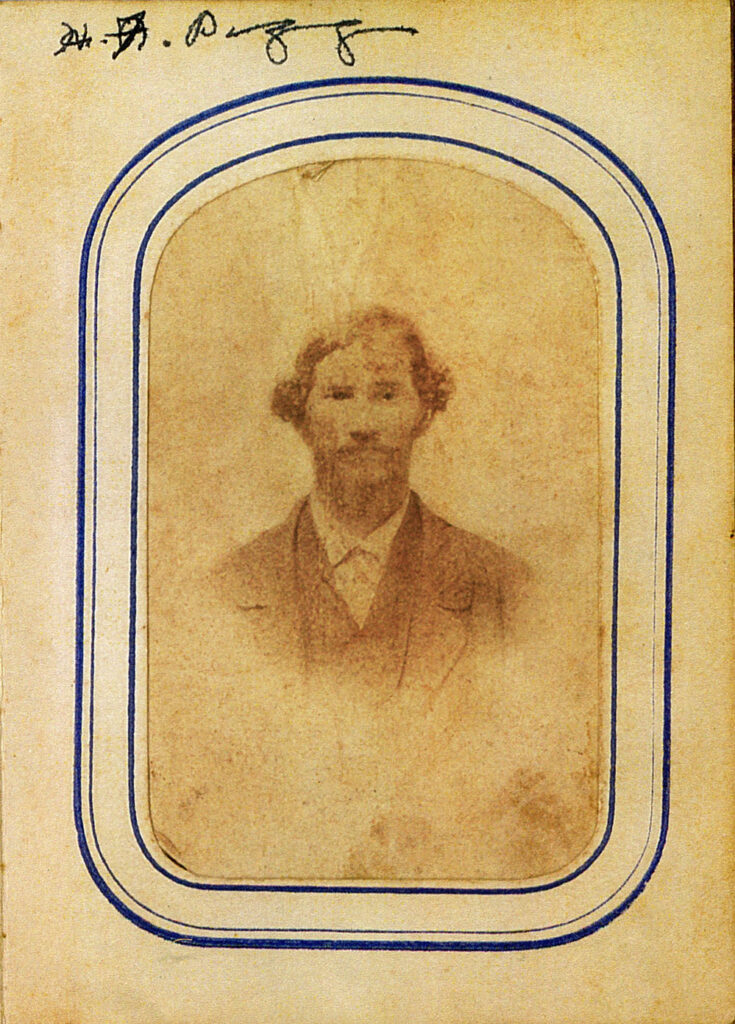
Hezekiah Ford Pigg
(digitally improved to remove spots & enhance contrast)
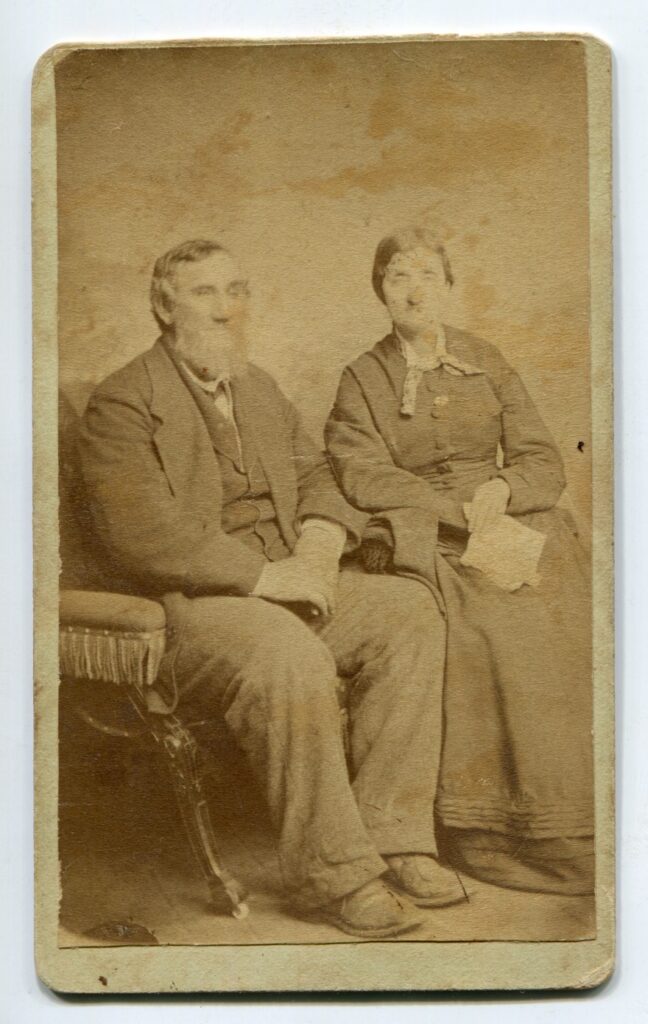
Hezekiah & Martha R. Pigg
(Courtesy of Dale & Becky Pigg)
The Pigg family has extensive notable influences throughout Virginia’s history. Colonial-era settlers became the namesake of the great Pigg River at the foothills of the Blue Ridge Mountains. In the early 1760’s, Capt. John Pigg (1716-1785) settled in the Piedmont region of what was then part of western Halifax County. In 1763, on a tract of 400 acres along Pudding Creek, a branch of the Banister River, John Pigg founded a grist mill. Four years later, the county boundaries were redrawn in Virginia and the county of Pittsylvania was formed from western Halifax. Pigg’s Mill became a local legacy and the building stayed in use until the 1950’s. The mill had its golden era under the ownership of Hezekiah Ford Pigg between 1850 and 1908.
Hezekiah Ford Pigg (1823-1908) grew up during the Antebellum era as the ninth of twelve children to Clement Pigg (1775-1849) and Nancy Elliott Pigg (1786-1859). The 1830 Census details that the property consisted of twenty-three enslaved people, including six boys under the age of ten. After the death of his father in 1849, Hezekiah inherited the mill property and took over its responsibilities at the age of twenty-five. Several months later, Hezekiah married an esteemed woman named Martha Henry Augusta Biddle Rutledge. With a name so long, one of their descendants joked to me, “They didn’t want to offend anybody.” Martha was named for all four of her grandparents, so it is certainly helpful for genealogy research. Together, Hezekiah and Martha Pigg had eight children, some of which did not live past infanthood. There were six boys and two girls as follows:
- Lysander Henry Pigg (1850-1894)
- Elizabeth Rutledge “Bettie” Pigg (1852-1947)
- David C. Pigg (1854-1855)
- Unnamed Infant Boy Pigg (1856-1856)
- John Hutchings “Hutch” Pigg (1857-1936)
- Unnamed Infant Boy Pigg (1859-1859)
- Nancy Alice “Nannie” Pigg (1860-1945)
- William Ward “Willie” Pigg (1863-1926)
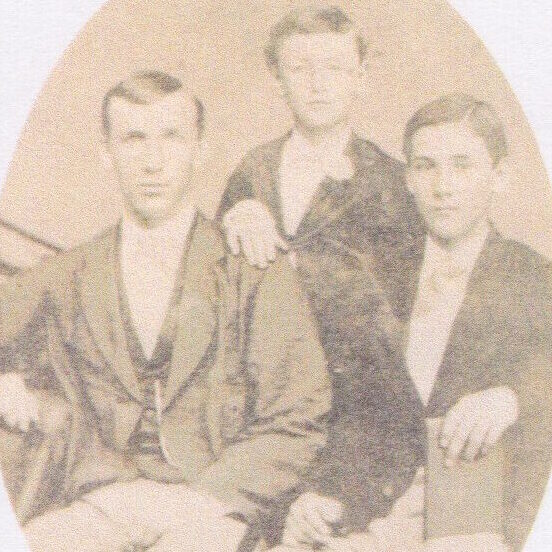
The 1860 Agricultural Census provides a thorough insight into the productions of the Pigg property during that year. The document shows the status of acreage value, livestock quantity and value, and the amount of produce grown. These numbers put into perspective the amount of labor and system management handled by the Pigg family during that time.
- 300 Improved Acres
- 300 Unimproved Acres
- $9,025 Cash Value of Farms
- $125 Value of Farming Implements and Machinery
- 2 Horses
- 3 Milk Cows
- 16 Other Cattle
- 24 Sheep
- 35 Swine
- $318 Value of Livestock
- $200 Value of Animals Slaughtered
- 150 Bushels of Wheat
- 250 Bushels of Indian Corn
- 200 Bushels of Oats
- 3,100 Pounds of Tobacco
- 100 Pounds of Wool
- 50 Bushels of Irish Potatoes
- 50 Bushels of Sweet Potatoes
- 150 Pounds of Butter
- 15 Pounds of Beeswax
- 200 Pounds of Honey
- $50 Value of Homemade Manufactures
During the American Civil War, Hezekiah Pigg served in the Confederate Army. He enlisted briefly as a Corporal in Company H of the 38th Virginia Infantry. While Hezekiah was away from the mill, there were neighbors and enslaved people keeping it in operation. Thomas Elliott (1812-1879), a first cousin, neighbor, and fellow miller, wrote to Hezekiah to update him on the status of the homeplace. This letter from August 4, 1861 provides an excellent layout of the conditions of the time period. It mentions two of my x4 great-grandparents, Permelia Giles Watson (1821-1882) and John Prewett/Pruett (1806-1876). Several of the other people mentioned are also relatives. Even Thomas Elliott, writer of this letter, is a collateral ancestor since his sister Bathsheba Elliott Mills (1825-1896) was my x4 great-grandmother. Here is what Thomas had to say:
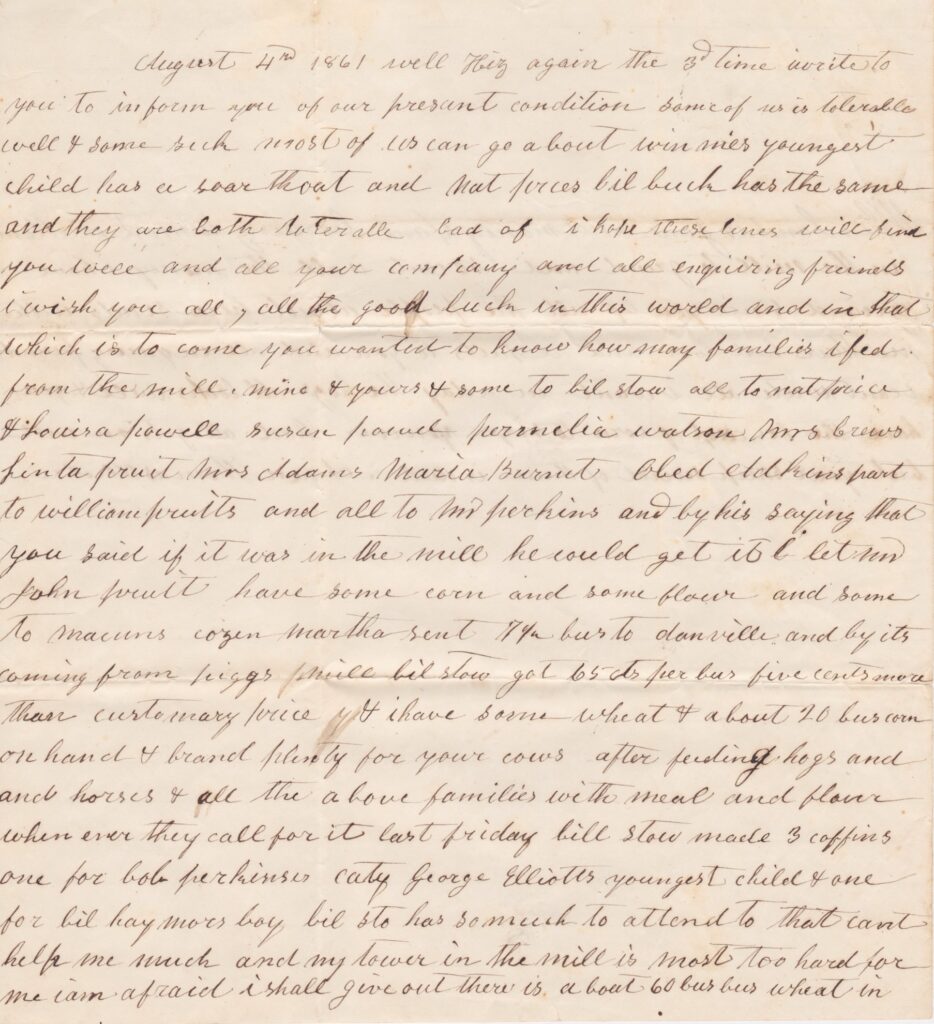
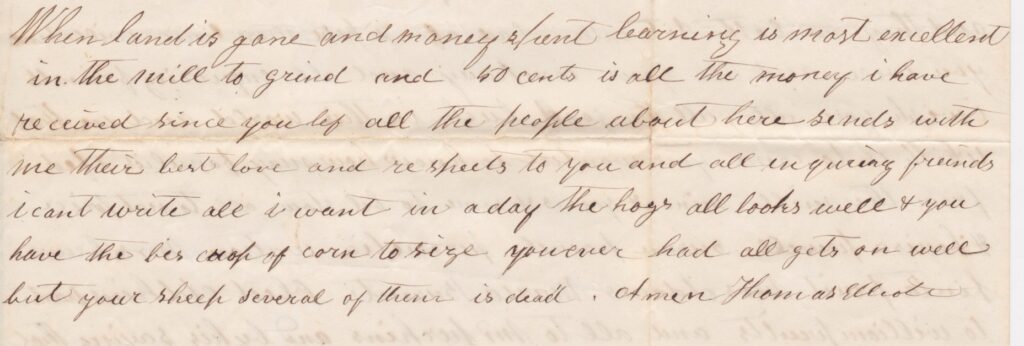
“August 4th 1861. Well Hez again the 3d time write to you to inform you of our present condition. Some of us is tolerable well & some sick. Most of us can go about winnies youngest child has a soar throat and Nat Prices Bil Buck has the same and they are both tolerable bad off. I hope these lines will find you well and all your company and all enquiring friends. I wish you all, all the good luck in this world and in that I which is to come. You wanted to know how many families I fed from the mill: mine & yours, & some to Bil Stow, all to Nat Price, & Louisa Powell, Susan Powell, Permelia Watson, Mrs Crews, Linta Pruit, Mrs Adams, Maria Burnet, Obed Adkins, part to William Pruits, and all to Mr Perkins. And by his saying that you said if it was in the mill he could get it. I let Mr John Pruit have some corn and some flour and some to Macuns cozen Martha. Sent 17 ½ bus [bushels] to Danville and by its coming from Piggs Mill. Bil Stow got 65 cts per bus–five cents more than customary price. & I have some wheat & about 20 bus corn on hand & brand plenty for your cows after feeding hogs and and horses & all the above families with meal and flour when ever they call for it. Last Friday Bill Stow made 3 coffins: one for Bob Perkins, Caty (George Elliotts youngest child), & one for Bil Haymores boy. Bil Sto has so much to attend to that cant help me much and my tower in the mill is most too hard for me. I am afraid I shall give out. There is about 60 bus wheat in. When land is gone and money spent learning is most excellent in the mill to grind and 50 cents is all the money I have received since you lef. All the people about here sends with me their best love and respects to you and all enquiring friends. I cant write all I want in a day. The hogs all looks well & you have the bes crop of corn to rize you ever had. All gets on well but your sheep. Several of them is dead. Amen Thomas Elliott.”
After nearly two months at war, he mustered out due to rheumatism. However, he reenlisted in 1862 into the 18th Virginia Infantry, company B as a Private. In 1864 he was granted furlough to return home to Pittsylvania County under a government contract to produce goods for the military. In an excerpt from the document, Hezekiah stated:
“I am under contract with Confederate States to tan a large amount of leather, which is yet uncompleted, and, for the faithful performance of which I am under heavy bond, and, when under the recent call for all detailed men I was conscripted left no one to attend to it except an old negro man.
In addition to this contract I have a considerable quantity of flour I promise to be ground for the Confederate States, which, I was compelled to lock up and leave, I desire to honestly fulfill these contracts and for this reason ask this furlough very Respectfully.
Hezekiah Pigg
Co “B” 18th Va Inf.”
After the war, Hezekiah made renovations to the mill and kept it running for over forty more years. As his children grew and became educated, they each became well known community leaders who make Pittsylvania County history all the richer. The extensive Pigg family business operations along Pudding Creek sprouted a community in itself by the 1890’s, comprising buildings such as the mill, a miller’s house, the main dwelling house with common dependencies, a blacksmith shop, a distillery, a schoolhouse, and a store with post office functionalities. Business operations paired well with the railroad depot down at nearby Dry Fork. Two brothers, Hutch and Willie Pigg, were the primary heirs after their father Hezekiah passed away in 1908. However, the properties were sold off again the same year to the Jones family and the Pigg family moved away from Virginia. Most of their descendants live in other states, so the Pigg family has not remained as well known in the twenty-first century as they were a century ago. They were some of the earliest documented settlers of the Dry Fork vicinity.
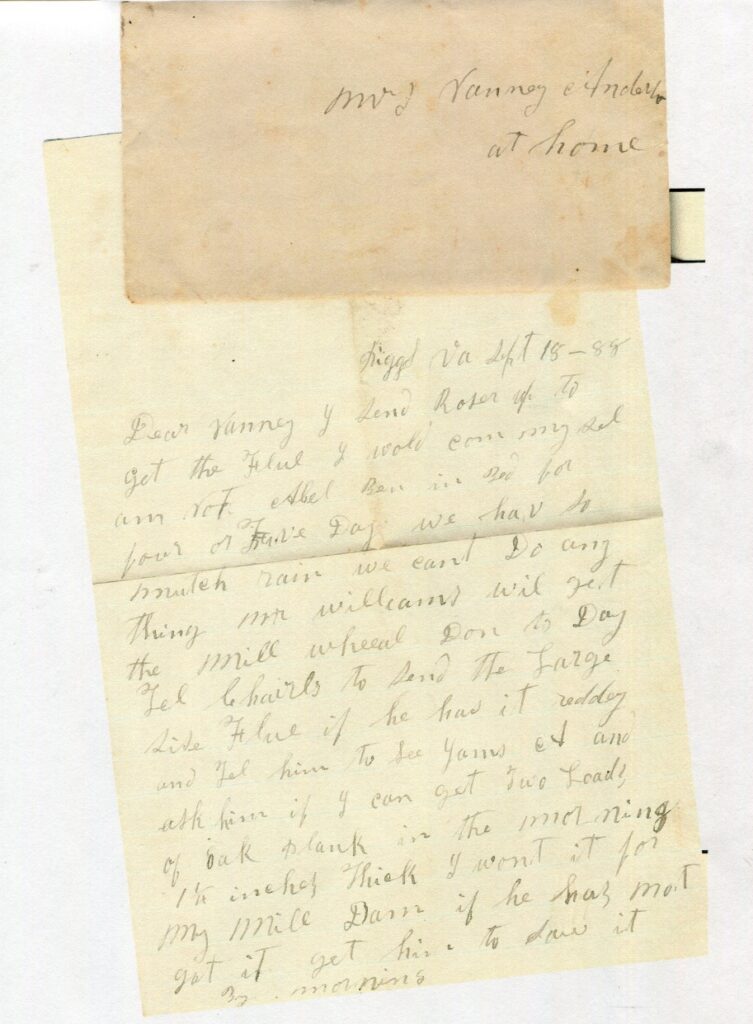
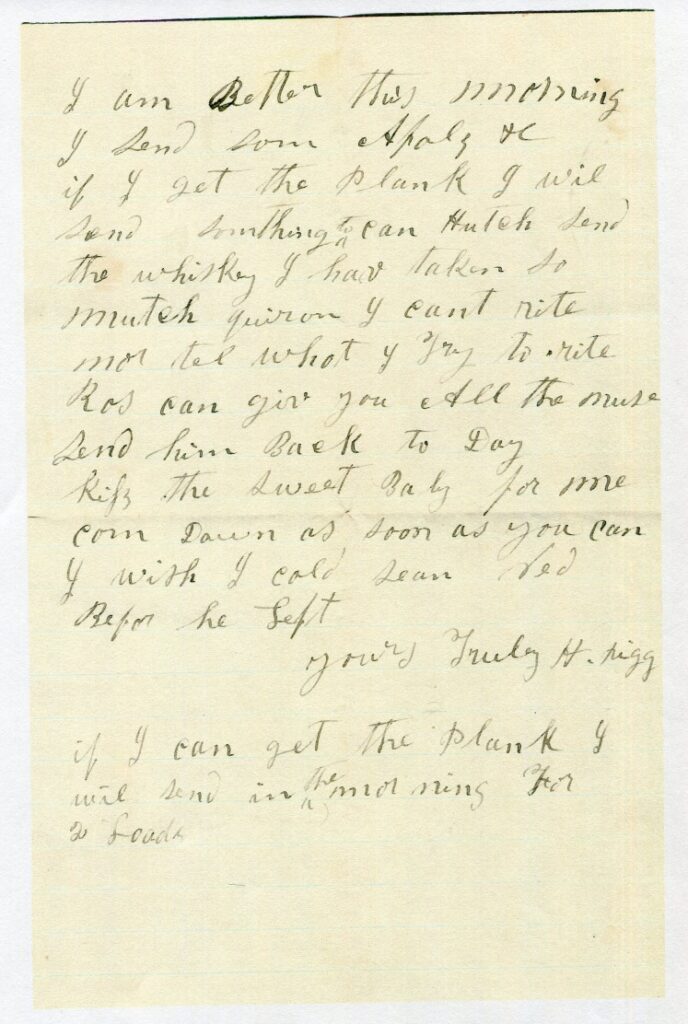
Letter from Hezekiah Pigg dated 18 September, 1888
(Courtesy of Dale & Becky Pigg)
The following is a letter written by Hezekiah Pigg to his daughter, Nannie Pigg Anderson. The envelope is addressed “Mrs. Nanny Anderson at Home.” Punctuation has been added to this letter for easier reading. I’ve also provided a replication of the same information with more standardized spelling and grammar.
“Piggs Va Sept 18-88
Dear Nanney, I send Roser up to get the Flue. I wold com my sel, am not Abel. Ben in Bed for four or Five Days. we hav so mutch rain, we can’t Do any Thing. Mr. Williams wil get the mill wheeal Don to Day. Tel Chairls to send the Large side Flue if he had it reddy and Tel him to see Jams A. and ask him if I can get Two Loads of oak plank in the morning, 1 ¼ inches Thick. I wont it for my mill Dam. if he has not got it, get him to saw it by morning. I am Better this morning. I send som Apals & if I get the Plank I wil send something to. can Hutch send the whiskey? I have taken so mutch quiron I cant rite mor. tel whot I Try to rite. Ros can give you All the nuse. send him Back to Day.
Kiſs the sweet Baby for me. com Down as soon as you can. I wish I cold sean Ned Before he Left.
Yours Truly, H. Pigg
If I can get the Plank, I wil send in the morning for 2 Loads.”
“Piggs, Virginia. September 18, 1888.
Dear Nannie, I’m sending [Rosa?] up to get the flue. I would come myself, but I am not able. I’ve been in bed for four or five days. We have so much rain that we can’t do anything. Mr. Williams will get the mill wheel done today. Tell Charles to send the large side flue if he had it ready, and tell him to see James A. and ask him if I can get two loads of oak plank in the morning, 1 1/4 inches thick. I want it for my mill dam. If he has not got it, get him to saw it by morning. I am better this morning. I send some apples & if I get the plank I will send something too. Can Hutch send the whiskey? I have taken so much [Quinine?] I can’t write more. Tell what I try to write. Ross can give you all the news. Send him back today. Kiss the sweet baby for me. Come down as soon as you can. I wish I could have seen Ned before he left.
Yours truly, H. Pigg
If I can get the planks, I will send in the morning for two loads.”
One thing that stood out from his handwriting was the usage of the letter “long s” when he wrote “kiss the baby.” Written flourishes such as that were more prevalent in the 1700’s, and could be considered quite old fashioned by the time of this letter. In the 1880 Census, there was a African-American man named Ross Jones, the son of Polly Jones, born in 1871. This is very likely the “Ros” Hezekiah mentions in the letter. “Chairls” is in reference to his son-in-law, Charles Anderson and “Jams A” is talking about his brother James Anderson who ran Anderson’s Mill in the Tomahawk Community.
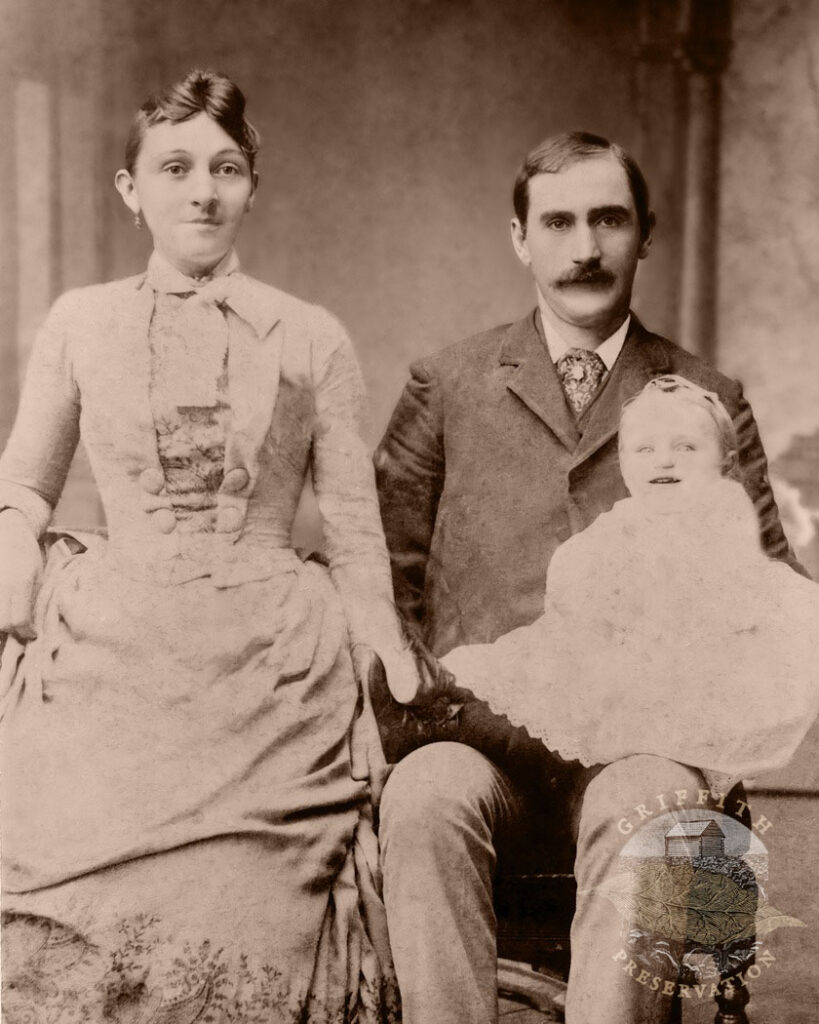
Hutch & Rada Pigg with their first daughter Mattie, 1889
(Digitally restored image)
Rada served as one of the first postmistresses of Dry Fork.
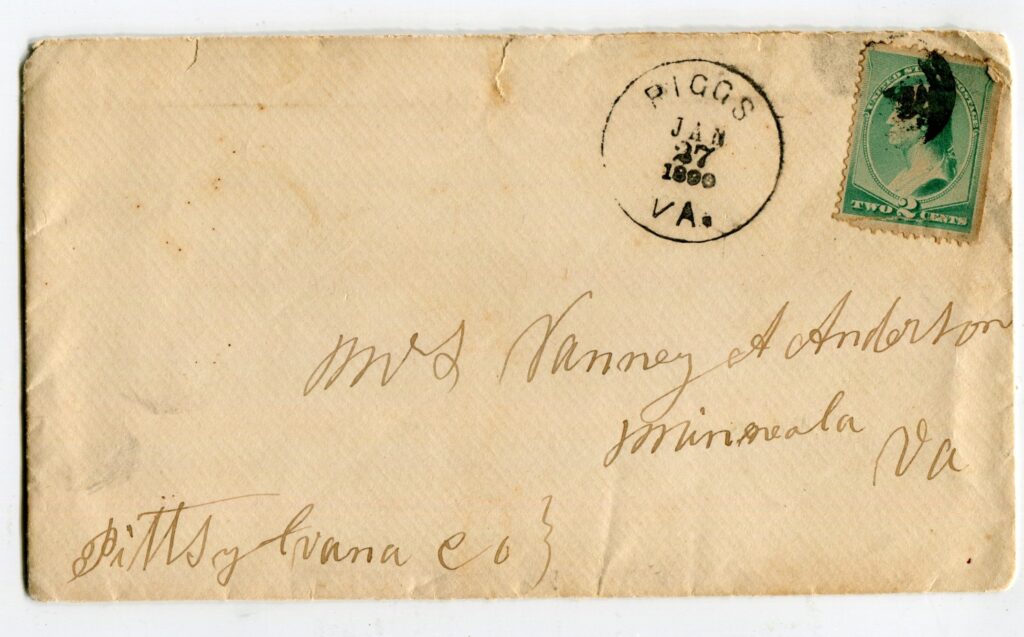
Letter postmarked in Piggs, VA in 1890 and addressed to Hezekiah’s daughter,
Nannie P. Anderson at her home called “Mineola” in Pittsylvania County.
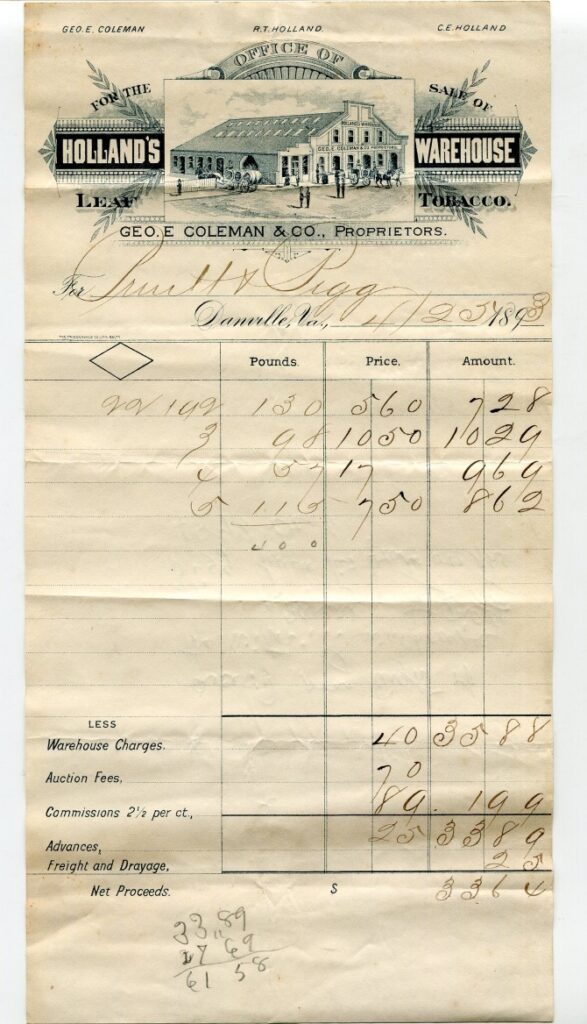
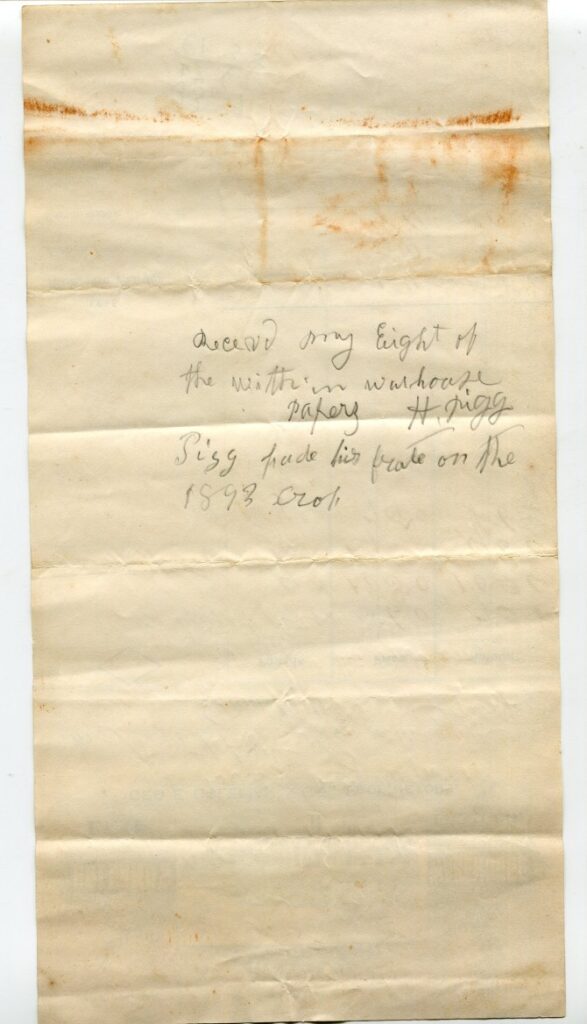
This is an 1893 receipt from Holland’s Tobacco Warehouse in Danville, Virginia. Both Hezekiah Pigg and my x3 great-grandfather Ephraim Pruett partnered in growing tobacco. On the backside, Hezekiah wrote “Recevd my eight of the within warehouse papers, H. Pigg” and then somebody else wrote “Pigg pade his frate on the 1893 crop.”
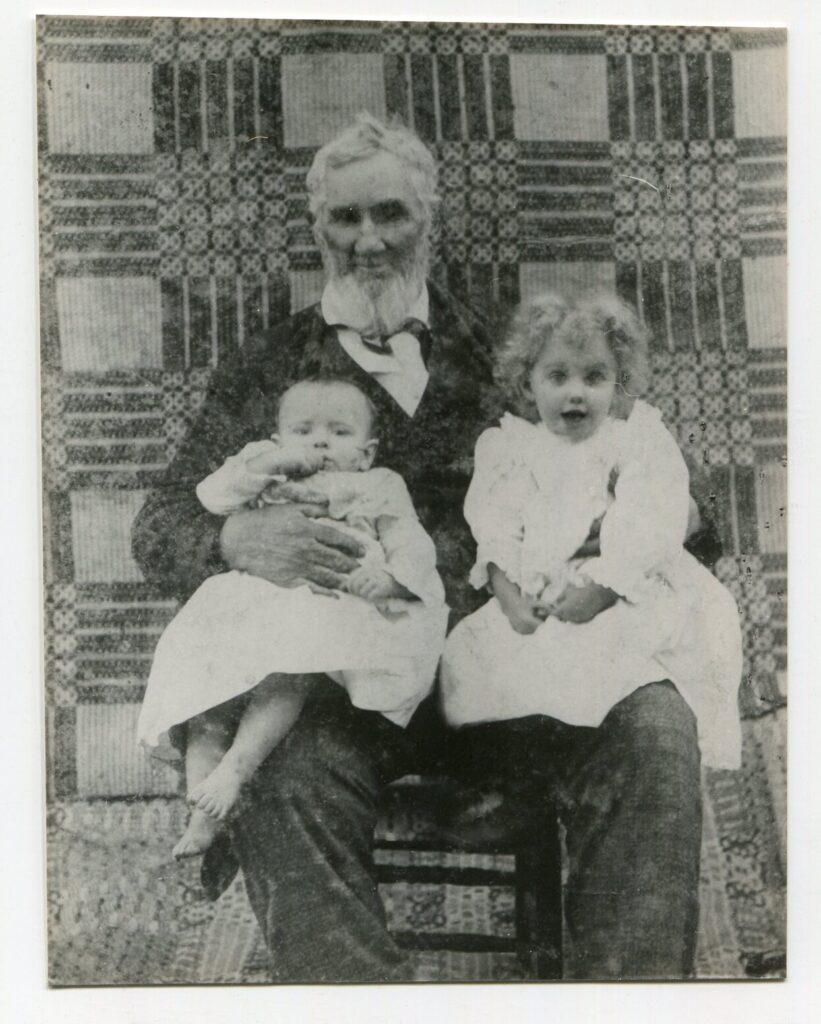
Circa 1895 photo of Hezekiah Ford Pigg with two grandchildren,
Hezekiah Ford Pigg (1893-1955) and Martha Susan Pigg (1892-1987)
(Courtesy of Dale & Becky Pigg)
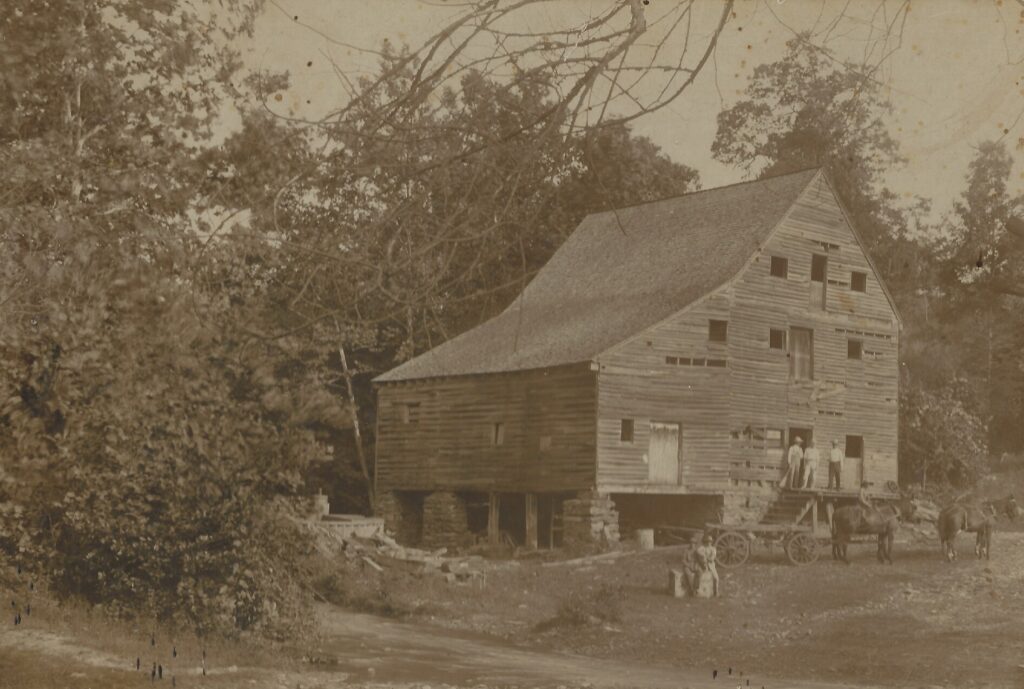
Pigg’s Mill around the time it became Jones Mill, circa 1908
(Courtesy of Jimmy Jefferson)

Jones Mill (Former Pigg’s Mill), as it looked after additions, circa 1950.
The mill burned in 1953.
(Courtesy of Dale & Becky Pigg)
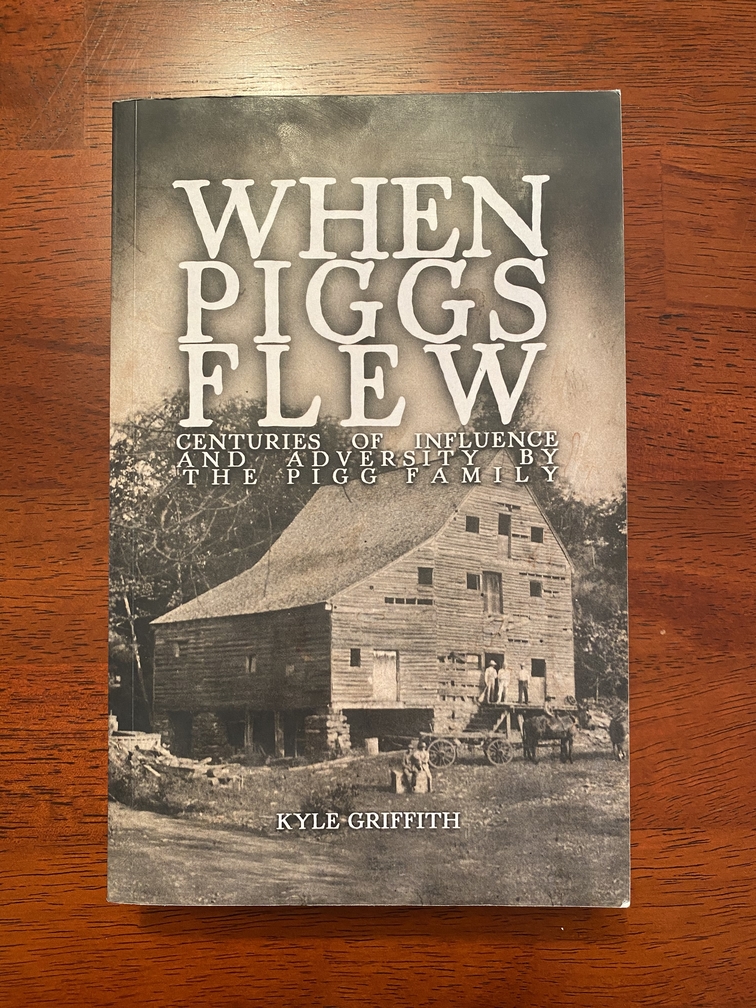
Recommended
When Piggs Flew
This research is featured in “When Piggs Flew” published in 2020. To read more about the Pigg family, find this book.

Hazel Grant Morris